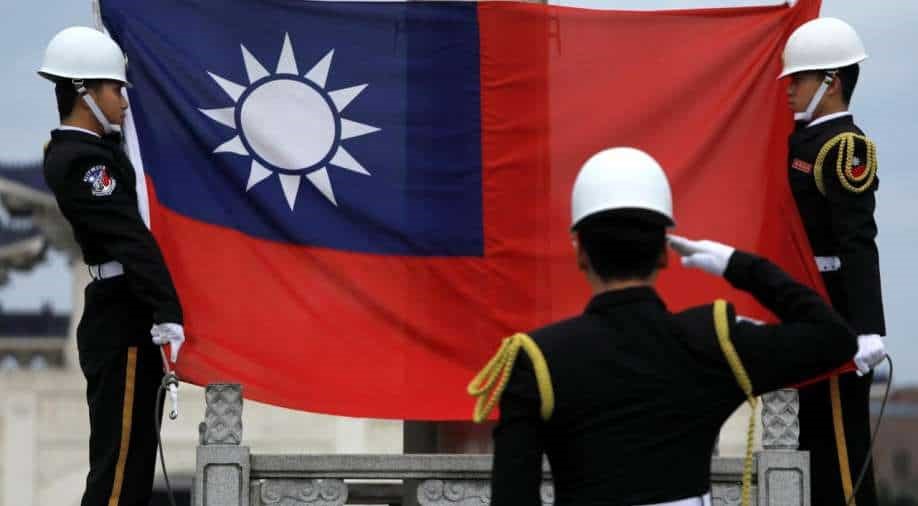Prof. Chintamani Mahapatra
16th October 2021

Chinese President Xi Jinping appears too impatient to use force and annex Taiwan and make it a province of the People’s Republic of China. About 149 Chinese fighter planes flew close to Taiwan’s airspace in a matter of 4 days in the first week of October and issued a stern warning to Taiwan not to aspire for an independent status.
This is not the first time that China has flexed its military muscle to threaten Taiwan of dire consequences, if Taipei would seek complete independence. China has issued such threats innumerable times since 1949.
But the Chinese belligerent military postures were never as threatening as it has been in recent weeks. The reaction against the Chinese military action has come from multiple capitals, namely from that of the United States, Japan, Australia and even Taiwan and it indicates that there is a dark cloud of suspicion, anxiety and possible war over Taiwanese sky.
Why is China showing its hostile face and intimidating Taiwan in the midst of a pandemic that has affected the health and lives of people around the world? The reason could be found in China’s domestic developments and changing image of China in the world. China is currently confronting numerous challenges in its domestic economic landscape and its persona in the world has also been fast flagging.
The energy shortages, slowdown in its economic growth, impact of the disruptions of supply chains, the real estate debt crisis, new regulations targeting the billionaires and tech companies, banning of private education and several other developments within China imply that President Xi Jinping is seeking external adventures to deflect the attention of disgruntled masses in the country.
The global criticism against the Uighur Muslim masses in Xinjiang, demolition of democratic polity in Hong Kong, continuing suppression of aspirations of the Tibetan people to maintain their cultural identity, encroachment of islands in South China Sea, repeated anti-Japanese naval expeditions in East China Sea, and bellicose show of force along the borders with India have considerably dented the Chinese image in the world. The Belt and Road Initiative, a signature mega project of President Xi, has also been hitting roadblocks in some countries. Moreover, alleged Chinese government’s complicity in the spread of the Corona Virus beyond China’s borders and slowing down of its economic growth have added to the damaging image of China spread across continents.
It is quite possible President Xi has planned to annex Taiwan—“unification” in his words—to bolster his image and then perpetuate authoritarian control over the party and the country. If he succeeds, the consequences will be wide-ranging and multifarious.
First, it will enhance the power profile of China and make it the second superpower in the world after the United States. Secondly, Chinese hegemony over the Indo-Pacific will go unchallenged. Third, the South China Sea may next become the Chinese Lake for all practical purposes. Fourth, China’s national wealth will considerably increase, if one would add the economies of Hong Kong and Taiwan. Finally, and significantly, it will deal a body blow to the power and influence of the United States in the Indo-Pacific region.
But the million-dollar question is will China be able to easily run over Taiwan and annex it? Will there be no resistance? It is common sense that Taiwan cannot on its own stand up to China in military prowess. Although the United States has been arming Taiwan for decades and Taiwan has a sophisticated military machine, it is no match to the present-day Chinese military capabilities.
Still, the billion-dollar question is will the United States risk a war with China over Taiwan? If it does, will the US allies, such as Japan and Australia be on the US side against China and for Taiwan? The US has not fought the Korean War, Vietnam War and Afghan War alone. And it will not fight a war with China alone. If Japan and Australia join the United States, their combined strength can be a credible deterrent against Chinese military action in Taiwan. If Britain wants to vent its frustration over what China did to Hong Kong, it can join the US as well.
However, the trillion-dollar question is will all these countries risk their economic ties with China to protect Taiwan. All these countries are democracies and decision-making on war would be a complex game in each of these countries. China is an authoritarian state and decision-making would be easier and thus it would be a cause for concern for other democracies.
All said and done, President Xi himself knows that any military invasion over Taiwan may or may not lead to a full-scale war with other countries. But diplomatic and political pressure will be enormous and even the economic consequences can be disastrous for China as well. The reactions of the United States, Japan and Australia and even the European Union are testimony to economic threat that President Xi would have to deal with, if he escalates the tension in the Taiwan Strait beyond airspace violation and indulging in war of words.
None of the major powers supports Taiwanese independence for obvious reasons: it would mean losing business in lucrative Chinese market. But no major power is likely to be helpless bystander, if China invades and annexes Taiwan.
World has tolerated Chinese mistreatment of Uighurs and Tibetans, and death of democracy in Hong Kong, but world is unlikely to keep quiet if Taiwan is militarily annexed. Since an element of surprise is always there over Chinese next step, anxiety in Taiwan and tension in the Indo-Pacific region are natural. It is also understandable that President Xi wants to hide the weaknesses within the country by invoking nationalism in foreign affairs.
![]()

